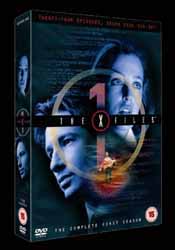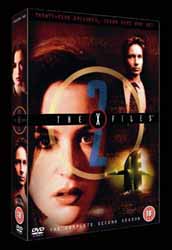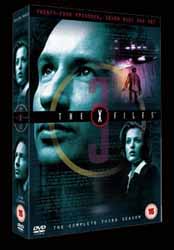|
Robert
K Ressler is a criminologist in private practice and the Director
of the Forensic Behavioral Services, an organisation dedicated
to training, lecturing, consultation and expert witness testimony.
Mr. Ressler is an expert on violent criminal offenders, particularly
in the area of serial and sexual homicide. He is a 20 year
veteran of the Federal Bureau of Investigation (FBI), serving
sixteen years in the FBI's Behavioral Science Unit as a Supervisory
Special Agent and Criminologist, retiring in 1990. He innovated
many of the programs which led to the formulation of the FBI's
National Center for the Analysis of Violent Crime.
Mr. Ressler's work has been the inspiration for many books
and
films including The
Red Dragon,
Silence
Of The Lambs,
Copycat,
and The
X Files.
Darren Rea spoke with him as the first three seasons of The
X-Files were
due to be repackaged and reissued on DVD...
Darren
Rea: It's long been said that your work, while at the FBI,
was the inspiration for Fox Mulder's character in The X-Files.
How did you feel about that?
Robert
K Ressler: Well, Chris Carter has stated on several occasions
publicly, that my book was used as one of the basic inspirations
for the concept of The X-Files idea. In other words
the FBI Behavioral Science Unit, which I wrote about in Whoever
Fights Monsters - which followed
my experiences in the behavioural science unit - dealt in
the types of areas of analysis and criminal profiling that
Chris Carter took off on in The X-Files. He was very
clever in that he didn't write his scripts along the lines
of the Behavioral
Science Unit,
but to give him more freedom of expression he created The
X-Files section of the FBI that is none existent. Although,
I hasten to add that while I have been involved in criminal
profiling, I've never investigated aliens or anything of that
kind [laughs].
DR:
Why is it that perfectly normal people seem to be fascinated
by serial killers? It's something that they are repulsed by,
but at the same time are strangely interested in. Why do you
think that is?
RKR:
I think it's the idea that it's a forbidden area that people
are afraid of. I always equate it to moths around an open
flame. If you've ever been camping you'll see that moths come
closer and closer to the light and some of them keep spinning
around the flame, others fly into the flame and I think those
are your serial killers - they get too close and get hurt
and their attraction is fatal.
DR:
What was it that attracted you into this field?
RKR:
As a kid I was really interested in horror movies - Frankenstein,
the Wolfman, Dracula and all that X-Files sort of material.
When I was a kid back in the '40s, a lot of that was kept
away from you because there were age limits to stop kids from
getting in to see these type of films.
As
I got closer to adolescence, I became more interested in detective
work and law enforcement. When I reached the university level
I majored in Criminology, when I entered the US Army as a
young man I immediately gravitated towards the Criminal Investigation
Division (CID) and then from there I went to the FBI and while
there I found myself getting into the FBI Behavioral Science
Unit.
DR:
You've interviewed many famous serial killers over your career,
including Ted Bundy and Charles Manson, is there anything
about these individuals that you admire?
RKR:
Admire is probably not the word I'd use, but I am somewhat
in awe of their ability to get away with their crimes for
so long. It becomes a challenge for me, and people like me,
to stop that cycle. You're not really admiring them as much
as you are in awe that they are able to commit these crimes
in sequence over a period of time.
DR:
Do you find that when they are finally caught that a lot of
them are relieved to have been captured, or do they not realise
that what they are doing is wrong?
RKR:
The ones that don't realise what they are doing is wrong -
the ones I call the disorganised types - are basically psychotic
individuals and are unaware of the difference between right
and wrong. But the great majority of them are the organised
types. These know the difference between right and wrong,
and they know what they are doing is wrong and continue to
do it.
DR:
Is there any possibility of rehabilitation, or do you think
that given half a chance these individuals would re-offend?
RKR:
Absolutely. They would, because they have no capacity for
remorse or guilt. The disorganised are mentally ill and the
organised have psychopathic personalities and they know the
difference between right and wrong, but they choose to do
what is wrong. They do it for their own gratification, they
feel that their satisfaction, sexual or otherwise, is paramount
and transcends the rights of their victim.
People
like this - the ones that are more candid and honest - I've
had them tell me in interviews that there fantasies are still
alive and well and that if they were released they would re-offend.
One guy told me: "If society is stupid enough to let
me go, I definitely will do it again."
A
lot of these people, if they're caught in their 20's or 30's
and are in prison in their 40's and 50's, I think the ones
I've had contact with acknowledge the fact that they're not
fit to live in society. They become institutionalised. They
become comfortable in a penitentiary setting and they do very
well.
DR:
You must have experienced some things that would take most
people to the edge of insanity. How do you cope with this?
RKR:
I sat across the table from a man who was killing to drink
human blood which he would mix with body organs in a blender.
He would drink this brew in order to, he claimed, sustain
his life. That one was organised and psychotic, but I interviewed
another "vampire" who was a sexual psychopath and
who would rape women and during the rape he would extract
their blood with a syringe and put it into a cup and drink
it. He claimed that the blood was an aphrodisiac. They all
do things for different reasons, all of which are off the
charts from normal reality.
DR:
With killers like the vampire inspired murderers are any of
them reliving a fantasy that they've seen on TV or in the
movies? And if so do you think that the media is in any way
to blame?
RKR:
I don't think so. These people are pathological and anything
will incite them, but some certainly have focussed on film
to satisfy themselves and fuel their fantasies.
Jeffrey
Dahmer, who killed 18 young men, told me that he was a great
fan of the film Hellraiser. Unleashing the demons from
Hell and maiming people and all that sort of thing, was very
exciting to him. But that really came after his pathology.
In other words it did not create it, it just fuelled the fires
of his original pathology.
DR:
Do you think that shows like CSI: Crime Scene Investigation
and detective shows, which inform viewers how murders were
committed and how criminals are caught, may aid a lot of serial
killers in covering up their crimes for a longer period of
time? That having some knowledge of how the establishment
works can keep them one step ahead of the law?
RKR:
There are different types of criminals and most of those that
have become serial offenders are very strongly impulse driven
and fantasy driven. The ones that I've had experience with
- if there's anything in common, it's the fact that they believe
that they are never going to be caught. For some reason they
believe that they are above the law. I think that's part of
their omnipotence that they develop - that they think they
are smarter than everyone. These don't really study up on
how to commit the perfect murder.
It's
the one time offender, the one guy who kills his wife for
example, who may well be inspired by that sort of thing. I've
been to crime sites were attempts have been made to destroy
evidence to confound the police. I know of one individual
who felt compelled to bite his victims. But he knew enough
about forensic evidence to cut away the bite marks to deny
the police that piece of evidence.
I've
seen cases where bodies have been set on fire to destroy DNA
evidence and one individual, a serial killer who sexually
assaulted his victims after he had killed them, would then
bath the bodies in a bath tub to remove any forensic evidence.
But guess what? He forgot to let the water out of the bath?
And the evidence was there for the police to examine. Even
the smartest ones can make mistakes.
DR:
Which crimes in your eyes are the most difficult to comprehend?
RKR:
I've worked on cases that involved vampires, cannibals, werewolves
and people who thought they were possessed, as well as satanic
and occult type cases. The
ones that are the most difficult to deal with, are the ones
were the killers seek out children as their victims and those
that totally destroy the bodies.
We
had a case in Chicago where William Heirens killed a six year
old girl and cut her body up into a number of parts and deposited
the arms, legs, head and torso in sewers in the neighbourhood.
Some killers go so far beyond what has gone before that they
transcend traditional murder and it's a little difficult to
comprehend sometimes.
DR:
Are you a religious man? Do you believe in God?
RKR:
Yes, I believe in God. I also believe in Satan. Certain people
believe in God, but they deny Satan - they believe in good,
but deny evil. That's inconsistent. If you accept one you
have to accept both. I have seen many cases that defy explanation
on a normal, rational, human level and it can only come from
Hell. I believe that evil possession is a very real possibility.
If you look at movies like The Exorcist, and things
like that, they all come from real life experiences.
DR:
Do you think that you could commit the perfect crime and get
away with it?
RKR:
[Laughs] I think I could come close, but thankfully I don't
even choose to fantasise about that. To be honest I don't
think I'd want to be the one that got away with it.
DR:
If you weren't in this line of work what would you be doing?
RKR:
That's an interesting question. Er... I'd probably be a gardener
- dealing with gardens and floral arrangements. I'm very interested
in water gardens where the only predators are the herons that
come to eat my coy. [Laughs] I don't know if you can equate
that to the job I finally ended up doing.
DR:
Thank you for your time.
  
With
thanks to Nina Criswick at DSA and Bella Gubay at Greenroom
Digital
Seasons
1-3 of The X-Files
are being repackaged and reissued on the 11 October 2004
Buy
season one of The X-Files on DVD for £24.49 (RRP:
£34.99) by clicking here
Buy season two of The X-Files on DVD for
£24.49 (RRP: £34.99) by clicking here
Buy season three of The X-Files on DVD for £24.49
(RRP: £34.99) by clicking here
Buy
books written by Robert K Ressler by clicking here
Click
here
to visit Robert K Ressler's website
Return
to...

|